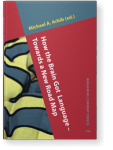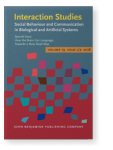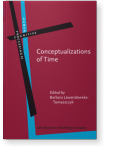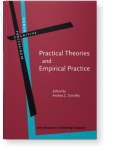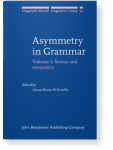James Pustejovsky
List of John Benjamins publications for which James Pustejovsky plays a role.
2020 The comparative neuroprimatology 2018 (CNP-2018) road map for research on How the Brain Got Language How the Brain Got Language – Towards a New Road Map, Arbib, Michael A. (ed.), pp. 370–387 | Chapter
We present a new road map for research on “How the Brain Got Language” that adopts an EvoDevoSocio perspective and highlights comparative neuroprimatology – the comparative study of brain, behavior and communication in extant monkeys and great apes – as providing a key grounding for hypotheses on… read more
2020 From actions to events: Communicating through language and gesture How the Brain Got Language – Towards a New Road Map, Arbib, Michael A. (ed.), pp. 289–317 | Chapter
In this paper, I argue that an important component of the language-ready brain is the ability to recognize and conceptualize events. By ‘event’, I mean any situation or activity in the world or our mental life, that we find salient enough to individuate as a thought or word. While this may sound… read more
2018 The comparative neuroprimatology 2018 (CNP-2018) road map for research on How the Brain Got Language How the Brain Got Language: Towards a New Road Map, Arbib, Michael A. (ed.), pp. 370–387 | Article
We present a new road map for research on “How the Brain Got Language” that adopts an EvoDevoSocio perspective and highlights comparative neuroprimatology – the comparative study of brain, behavior and communication in extant monkeys and great apes – as providing a key grounding for hypotheses… read more
2018 From actions to events: Communicating through language and gesture How the Brain Got Language: Towards a New Road Map, Arbib, Michael A. (ed.), pp. 289–317 | Article
In this paper, I argue that an important component of the language-ready brain is the ability to recognize and conceptualize events. By ‘event’, I mean any situation or activity in the world or our mental life, that we find salient enough to individuate as a thought or word. While this may sound… read more
2016 Situating Events in Language Conceptualizations of Time, Lewandowska-Tomaszczyk, Barbara (ed.), pp. 27–42 | Article
It is currently acknowledged that events constitute an integral part of the metaphysics
and semantic machinery for interpreting natural language utterances
(Davidson 1967, 1980). Most research into event semantics since Davidson
and Parsons (Parsons 1990) has focused on questions relating to either… read more
2012 The semantics of functional spaces Practical Theories and Empirical Practice: A linguistic perspective, Schalley, Andrea C. (ed.), pp. 307–324 | Article
In this chapter I examine the ways in which languages encode the distinction between location and place, generally, and between objects and their uses in space, in particular. I develop a type-theoretic semantic formalism to model the notion of ‘function’, whether associated with a region or… read more
2008 From concepts to meaning: The role of lexical knowledge Unity and Diversity of Languages, Sterkenburg, Piet van (ed.), pp. 73–84 | Article
2003 Categories, types, and qualia selection Asymmetry in Grammar: Volume 1: Syntax and semantics, Di Sciullo, Anna Maria (ed.), pp. 373–393 | Article
